Capone: The Life and World of Al Capone (13 page)
Read Capone: The Life and World of Al Capone Online
Authors: John Kobler

Accardo Giancova, bodyguard.

Johnny Torrio, president emeritus.
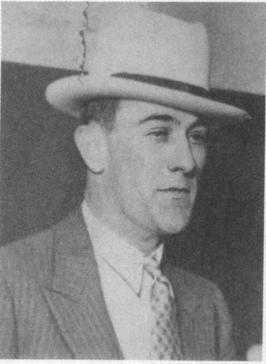
Sam Hunt.
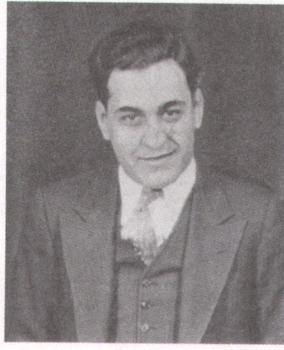
Tony "Joe Batters" Accardo, triggerman.

Acme Photo.
Phil D'Andrea, chief bodyguard.
Jake "Greasy Thumb" Guzik, business manager.
United Press International.
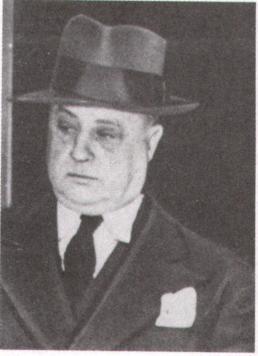
Ralph Capone, sales manager.
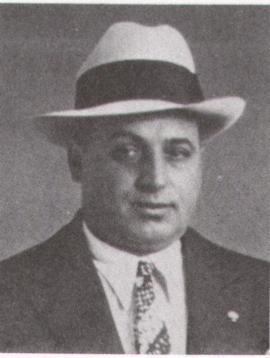
Tony Lombardo, consigliere.
Chicago Tribune.
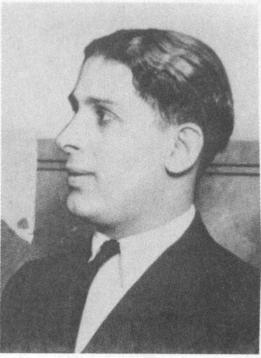
His pride and joy was his cafe, where he could truckle to celebrities and be flattered and fussed over by them. In his dedication to the resort he gave Torrio virtual autonomy in the management of everything else. This was his first grave mistake, for it emboldened Torrio to strike out on his own; it created a conflict of interest. The second mistake was a romantic one.
One evening in 1913 a Chicago News reporter, Jack Lait, came into Colosimo's Cafe lyrical over a girl he heard singing with the choir of the South Park Avenue Methodist Church. She had, he told Colosimo, beauty and talent, and she deserved a better opportunity to display them. Why didn't he put her in his floor show? Big Jim agreed to audition this paragon, and the next evening Lait introduced him to a demure, slender brunette with blue eyes and skin like white rose petals.
Dale Winter was nineteen, an Ohioan by birth, who dreamed of an operatic career. Her father died when she was five. After high school, where she shone in the glee club, her mother took her to New York. She auditioned for the producer George Lederer, who was casting a road company version of the operetta Madame Sherry, a smash hit, with its saucy song "Every Little Movement Has a Meaning All Its Own." He assigned Dale the ingenue role. Chaperoned, as always, by her mother, she traveled across country to San Francisco, where the tour ended. With another actress she then contrived a vaudeville sketch, sold it to a company about to take off for Australia, and went along to play the main part. In Australia the venture collapsed, stranding mother and daughter 6,000 miles from home. Borrowing money from a kindly actor, they got back to San Francisco. A booking agent sent them on to Chicago, where, he assured them, Dale would find work with a newly organized light opera company. They arrived penniless only to learn that the company had disbanded without giving a single performance. The South Park Avenue Methodist Church saved them from starvation by employing Dale as its soloist.
Big Jim found Dale Winter as delectable as Lait had pictured her, and he needed no persuasion to hire her. She became his star attraction, enchanting the customers every night with a repertoire of light operatic arias. She did not want to leave the church choir, however, and she continued to sing hymns by day until the congregation discovered her connection with Colosimo's Cafe. The churchgoers were scandalized. They demanded her immediate dismissal. The pastor was more tolerant. As the text for his next sermon he chose John 8:7: "He that is without sin among you, let him first cast a stone at her." But the congregation was unmoved. He had to let Dale go.
The Levee was hardly a congenial environment for such a girl, and she promised herself she would quit the moment she had saved enough money to return with her mother to New York. Grand opera was still her dream. As the star of Colosimo's floor show, she encountered no dearth of better job opportunities. The Broadway impresario Morris Gest offered her a contract. So did the mighty Florenz Ziegfeld. She turned them both down, for by then Colosimo had fallen in love with her and she with him. Big Jim left his wife, Victoria. "This is the real thing," he assured Torrio. "It's your funeral," said Torrio.
Under Dale's gentle prodding Big Jim acquired some slight polish. He learned to modulate his bull horn of a voice and to use politer language. He hired a tutor to teach him correct English. He dressed more conservatively, adorning himself with fewer diamonds. He neglected the politicians and underworld characters among his clientele in favor of the artists and the swells from uptown. Dale liked to ride horseback through the city parks, and Big Jim, attired in equestrian togs, would trot along beside her.
Her ambition became his. He badgered his friend Caruso for an opinion of her voice. The great tenor pronounced it pleasing and asked Maestro, Campanini to grant her an audition. The conductor, too, liked her voice but felt it required retraining. At his suggestion Colosimo enrolled her in the Chicago Musical College.
The irony was that Dale Winter, the only decent girl with whom he had ever had a close relationship, should be an instrument of his destruction, for in the pecking order of the underworld such emotional vulnerability was an invitation to rebellion. The word went around: "Big Jim's getting soft. Big Jim's slipping." The extortionists resumed their demands, but he no longer fought them. He paid up, probably because they also threatened Dale, and they plagued him to his dying day.
Torrio, meantime, while continuing to administer his uncle's domain, slowly and quietly built his own organization. He prepared the ground for other outposts of vice besides Burnham. He found the officials of Stickney, a village eight miles west of the Levee, equally amenable. In the Levee itself, a block from Colosimo's Cafe, he took title to a four-story red brick building thereafter known as the Four Deuces because of the address-2222 South Wabash Avenue. On the first floor he installed a saloon and office, separated by a steel-barred gate. Solid steel doors led to gambling rooms on the second and third floors, and on the fourth floor he installed a brothel. It was at about this time, in late 1919, that Torrio sent for Al Capone.
Capone's initial duties were varied and humble-bodyguard, chauffeur, bartender, capper for the brothel. "I saw him there [in front of the Four Deuces] a dozen times," the journalist Courtney Ryley Cooper remembered, "coat collar turned up on winter nights, hands deep in his pockets as he fell in step with a passer-by and mumbled: 'Got some nice-looking girls inside.'"
The cellar had an unusual feature, whose purpose was revealed to Judge Lyle. "I got some first-hand information on the resort from Mike de Pike Heisler who bitterly resented the mob's invasion of his field," the judge wrote. "Shuffling into my chambers one afternoon, he told me: `They snatch guys they want information from and take them to the cellar. They're tortured until they talk. Then they're rubbed out. The bodies are hauled through a tunnel into a trap door opening in the back of the building. Capone and his boys put the bodies in cars and then they're dumped out on a country road, or maybe in a clay hole or rock quarry.'"
Years later a retired police lieutenant, who had once patrolled the neighborhood, took judge Lyle through the now-abandoned building. They came upon the tunnel and the trap door. The policeman said that at least twelve gangsters had been killed in the Four Deuces.
Soon after Al Capone, or Al Brown, to use his favorite alias, moved to Chicago, there occurred a momentous event. The foresighted Torrio had long been planning for it. He had been urging Colosimo to marshal all his resources to exploit it. The profits, Torrio was certain, would dwarf everything they had ever made from vice. But Big Jim, torpid with love, could muster no energy for new ventures. Whoremongering and gambling had brought him a fortune. They were still lucrative. Why risk the unknown? Besides, this crazy new situation couldn't last. Torrio knew then that his uncle's sun was setting.